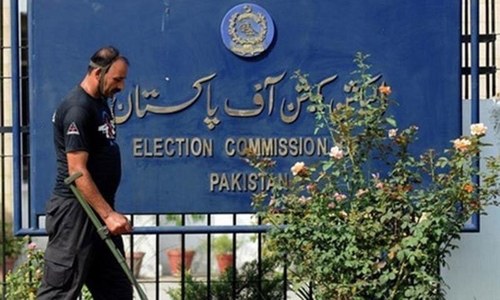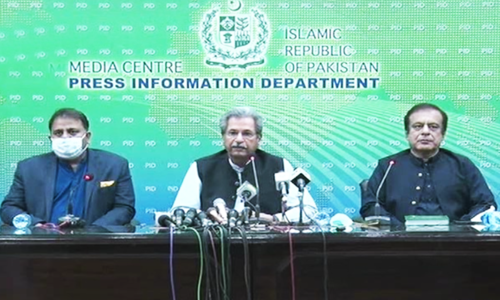THE PTI government wants the entire Election Commission of Pakistan to resign because apparently the prime minister is unhappy with the institution for not bowing to his whims. This can only be termed an attempt to undermine the authority and independence of a constitutional body. The unprecedented attack on the ECP is yet another manifestation of an authoritarian mindset that seeks to dominate every state institution.
Editorial: The govt's demand for the resignation of ECP members is highly inappropriate
A bevy of federal ministers at a press conference this week claimed that the ECP could not continue functioning in its current state because it failed to stop the alleged horse-trading in the recent Senate elections. Accusing it of partisanship they declared that the ECP had lost the confidence of the people. They were echoing the earlier remarks of the prime minister against the commission.
While demanding the resignations of the ECP members the government has ruled out constitutional recourse to filing a reference (in the Supreme Judicial Council) against the ECP. It seems it wants to force them out through other means, a hallmark of hybrid rule. But such tactics may not work as the government itself is in dire straits. Any attempt to intimidate the constitutional body could end up further weakening the regime itself.
While the allegations of foul play in the Senate elections might have been used by the government to demand the ECP members’ resignation it was in fact the election body’s action in the Daska by-election that provoked the ire of the ruling party. The ECP has come out with a damning indictment of the Punjab provincial administration and has held it responsible for violence and vote manipulation. In a bold move, it has ordered a re-poll in the entire constituency. It was indeed rare for the electoral body to show such spine.
The ECP’s statement shows that its members have the courage to stand up to government pressure.
But it was the ECP’s statement in the Supreme Court on changing the rule on secret balloting in the Senate elections that brought the conflict to a head.
It was simply a legal position on the part of the ECP that the voting rule could only be changed through a constitutional amendment. The government wasn’t happy with the argument as it wanted the ECP to follow the PTI line. Such expectation from an autonomous body whose main responsibility is to ensure fair and free elections is beyond comprehension.
Following the court’s rejection of the presidential reference, the ruling party had tried to build pressure on the ECP to put a barcode on the ballot paper in order to identify voters switching sides. The argument was that this could prevent horse-trading in the Senate polls. The ECP did not entertain the proposal on the ground that it would compromise the secrecy of the ballot. That obviously didn’t go down well with the government. The defeat of the finance minister on the Senate seat from Islamabad brought the conflict to a head. The government blamed the ECP for the poll upset.
Controversy over money changing hands in the Senate elections is not new. There is a ring of truth to the allegations of wrongdoing in the latest polls too. Some video and audio recordings reinforce the accusation of horse-trading. But blaming the ECP for not stopping it is outrageous. The case against the opposition is still being investigated.
In an unprecedented move, the prime minister in an address to the nation blasted the ECP accusing it of “damaging democracy”. He blamed the body for supporting secret voting that caused his party’s defeat in the capital’s Senate seat poll. He accused the ECP for “protecting those who made money by holding the Senate elections through secret ballot”. It was an unprecedented assault by the country’s prime minister on a constitutional body.
While blaming the ECP for the poll upset he does not seem to accept the fact that it is parliament’s responsibility to make laws. Indeed, the business of buying and selling votes has badly damaged the credibility and legitimacy of parliament and it is imperative to eradicate this curse in order to restore public faith in elected institutions. But for that there is a need to develop a consensus in parliament.
It was too late by the time the PTI moved the bill for open voting just weeks before polling and that too without building the bipartisan consent needed for a constitutional amendment. It was also unwise of the government to file a reference in the Supreme Court hoping that it could bypass parliament. It was extremely irrational of the prime minister to dump the blame for his missteps on the ECP.
Matters turned uglier still when the ECP responded to the prime minister’s diatribe with an equally strongly worded rebuttal. It rejected the prime minister’s “discussion and unhappiness” over the way the polls for the upper house of parliament were conducted. “This is democracy and free elections and the beauty of free elections which the entire nation saw and which is mandated by the Constitution,” the ECP declared in a statement.
There may be some objections over the tenor of the ECP’s response to the prime minister’s remarks, but one cannot dispute the rationality of its stance. The statement shows that the chairman and the members of the commission have the courage to stand up to the government’s pressure. It was unbecoming of the head of government to slander a state institution in the first place.
Interestingly, it was the PTI government that with the consent of the opposition had appointed the current ECP chairman, a retired civil servant known for his uprightness. With such a person at the helm, the ECP has been more assertive in attempting to make the electoral process transparent and fair. A powerful and independent election commission can ensure the legitimacy of the elections.
The credibility of the electoral body is most critical for strengthening the democratic process in the country. Instead of making it an issue of ego, the prime minister must think more rationally. Such a mindless campaign against a constitutional body will not only damage the government, it will also harm the democratic process in the country.
The writer is an author and journalist.
Twitter: @hidhussain
Published in Dawn, March 17th, 2021















































